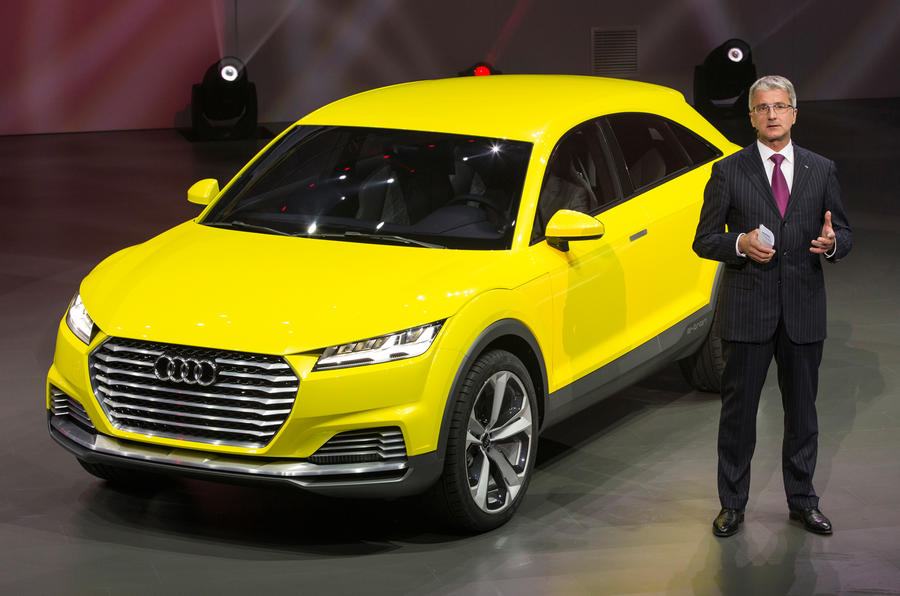Audi is about to kick off a new expansion phase to in an effort to establish clear leadership of the world premium car market by 2020.
It aims to achieve this by increasing its model count from 50 to 60, helping it push its current record volume ahead another 20 percent to two million units a year.
Speaking at an event in Copenhagen to mark 25 years of TDI diesel engines, Audi chairman Rupert Stadler said the company would begin a new expansion phase this autumn to reach its aggressive new targets — which would depend heavily on diesel sales continuing to boom.
Underscoring its continuing dependence on diesel sales, the company is close to approving a new range of high-performance diesel models, possible carrying the RS badge, following a positive reception for its recent 380bhp RS5 TDI-e concept car.
The new range could be topped with a limited edition supercar in the Le Mans mould, an idea first mooted 18 months ago.
The company has so far built 7.7 million TDI powered cars, he said, and four in every 10 Audis was a diesel. In some markets, the diesel take-up was as high as 90 percent; even in the diesel-sceptical USA, take-up was around 30 percent and rising.
Audi's dependence on diesel sales makes it especially keen to take back the high ground in diesel development. It was led by its rivals to the adoption of refinements like common-rail fuel injection and “intelligent” piezo injector technology.
More recently, the company has announced its intention to bring to production electrically-driven turbochargers (already used in its racing programmes), as a way of cutting turbo lag, in a new range of performance-oriented diesels.
Referring to recent progress with diesel research, Stadler reckons his company "is now the strongest" of the premium marques, noting that on average TDI engines have doubled in power in 25 years, while their output of toxic emissions has declined 90 percent.
Furthermore, Audi engineers believe efficiency advances of another 15 percent are possible before the end of the decade.
Stadler believes diesels could dominate Audi's range as far ahead as 2030, though he believes plug-in hybrids will play an increasingly important role. "Electrification is much more expensive than continuing to improve the combustion engine, so we believe the TDI will continue to have the biggest impact for quite a long time."
On performance diesels, Stadler acknowledges that Audi is working to ensure its diesels “deliver an RS feeling” as well as the expected high torque and good fuel economy.









Join the debate
Add your comment
They gets what they gets
Viel Glück damit...
That market is getting crowded. Off the top of my head:
1. Tesla is offering a completely new category of product, which appeals strongly to the tech-obsessed new rich, although BMW's i8 is a compelling counter-argument. Speaking of...
2. BMW are still moving forward. Their focus on bargain-basement fleet sales has hurt their image, but they've still got a lot of technological leadership over Audi, and nobody ever called a 3-Series a "rebadged Passat" (I know the A4 isn't, but perceptions persist long after facts change).
3. Jaguar has now been properly funded, and is about to challenge the middle executive market that Audi believe they own. The UK is a very lucrative market for Audi (10% of its global sales), but let's see how that changes when a highly competitive British product is put into the mix. Jaguar also taps into the 1950s and 60's playboy glamour that the US market loves, just like...
4. Maserati and Alfa Romeo. Italy is waking up from a bad dream. At the high-end of Audi's target buyers, Maserati is now getting so many orders it may have to consider revising its self-imposed production limit; and in the mainstream luxury market Alfa Romeo is about to launch a full range of all-wheel and rear-wheel driven models (lack of RWD is Audi's achilles heel). Both brands have always had more emotional appeal than Audi; now they're getting the technology to back it up... and vastly expanded distribution and sales in the USA. (Alfa already has 90 dealerships signed up in North America to Audi's approx. 300, and Alfa doesn't even have a product range yet!)
5. Lexus. As soon as Sino-Japanses relations return to normality, Toyota will reclaim its share of the Chinese premium market. In the USA, they're already the gold standard premium brand; in the USA, Audi are not well regarded at all (sales are good, but repeat sales are the worst in the sector, with over half the customers who buy an Audi not returning to buy another to replace it with)
6. Mercedes. Trading on their past glory, but (and especially in the USA), people still aspire to owning a "big Merc" more than a "big Audi".
I hope they've defined "leadership" in sufficiently vague terms to be able to explain themselves when they find themselves with slightly reduced market share by 2020.
Every review of a mainstream audi
No handling appeal, dull to drive but an acceptably nice place to sit.
When you look at how cheap VAG can make the cars you have to wonder if they aren't the ones laughing when they charge a massive premium for the same car that never actually does anything better than anyone else. Except tailgating